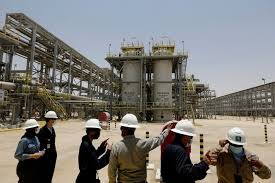Saudi Arabia’s Aggressive Oil Supply Cut: Brace for Surging Gas Prices for US Drivers
Saudi Arabia has decided to reduce its oil exports to the global market, taking matters into its own hands to address the declining price of crude. This step comes after previous attempts by major producing countries in the OPEC+ alliance to cut supply failed to have the desired impact on oil prices.
Starting in July, Saudi Arabia will cut its daily oil production by 1 million barrels. Meanwhile, other OPEC+ producers have agreed to extend their production cuts through the next year during a meeting held in Vienna.
Describing this reduction as a “lollipop,” Saudi Energy Minister Abdulaziz bin Salman emphasized the goal of stabilizing the market, stating that they are prepared to extend the cut if necessary.

Jorge Leon, Senior Vice President of oil markets research at Rystad Energy, believes that while this move could initially drive up oil prices, its long-term impact will depend on Saudi Arabia’s decision to extend the cuts. He sees the cut as providing a price floor, as the Saudis have flexibility in adjusting the voluntary reduction as needed.
The recent slump in oil prices has benefited U.S. drivers, allowing them to fill their tanks at a lower cost and offering relief from inflation globally. However, Leon warns that gas prices are unlikely to decrease further and may even experience a slight increase.
Saudi Arabia’s decision to implement another cut underscores the uncertain outlook for fuel demand in the coming months. Concerns exist regarding economic weakness in the United States and Europe, and China’s recovery from COVID-19 restrictions has been less robust than anticipated.
As the dominant producer in the OPEC oil cartel, Saudi Arabia previously participated in a surprise cut of 1.6 million barrels per day in April, with its share amounting to 500,000 barrels. This followed the OPEC+ announcement in October to slash production by 2 million barrels per day, which drew criticism from U.S. President Joe Biden due to its potential impact on gasoline prices ahead of the midterm elections.
In total, OPEC+ has reduced production on paper by 4.6 million barrels per day. However, due to some countries’ inability to meet their quotas, the actual reduction is estimated to be around 3.5 million barrels per day, representing over 3% of global supply.
Previous cuts have provided only temporary support to oil prices. Although international benchmark Brent crude briefly reached $87 per barrel, it has since retreated and has been hovering below $75 per barrel in recent days. U.S. crude prices have also dipped below $70.
While these lower prices have benefited U.S. drivers at the start of the summer travel season, with the average pump price at $3.55, down $1.02 from a year ago according to the auto club AAA, falling energy prices have also contributed to a decrease in inflation among the 20 European countries that use the euro, reaching the lowest level since before the Russia-Ukraine conflict.
Saudi Arabia heavily relies on sustained high oil revenue to finance ambitious development projects aimed at diversifying its economy. The International Monetary Fund estimates that the kingdom needs oil prices to reach $80.90 per barrel to fulfill its spending commitments, which include the futuristic desert city project called Neom, with an estimated cost of $500 billion.
Recent actions by the United States, such as replenishing its Strategic Petroleum Reserve after the largest release in its history last year, indicate that U.S. officials may be less concerned about OPEC cuts compared to previous months.
While oil-producing countries like Saudi Arabia need revenue to support their state budgets, they must also consider the impact of higher prices on oil-consuming nations. Excessively high oil prices can fuel inflation, eroding consumer purchasing power and potentially prompting central banks, such as the U.S
Also Check: Be Careful Of Bitcoin/BTC Trading WhatsApp Groups Scam
Follow us or bookmark us for more Business Technology Entertainment News Celeb Bio box office collection report celebrities trailers and promos